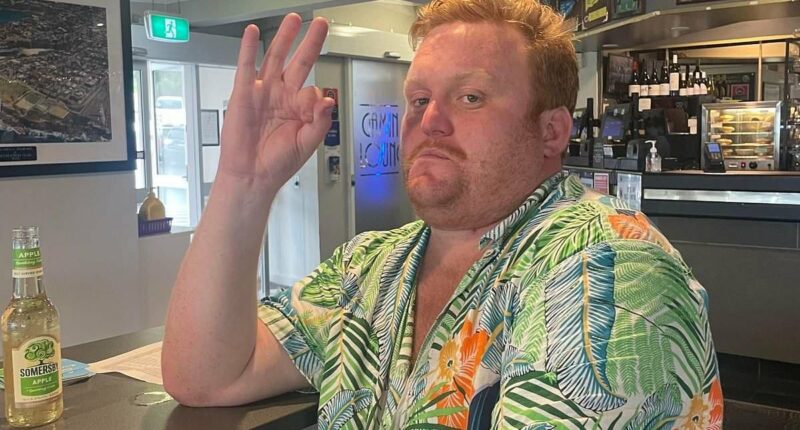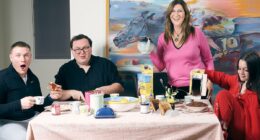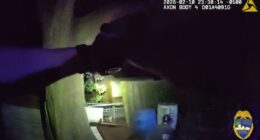Share this @internewscast.com
Weekends always started the same way for William Pattison.
After abstaining from alcohol all week, he’d get stuck into some Friday afternoon beers. But letting off steam after a long week never ended there.
‘I never really drank midweek, but come the weekend, I’d go on heavy benders that could last two or three days. No sleep. Just escaping,’ William, 30, tells me.
‘The cycle was brutal. I’d feel like a shell of myself during the week – anxious, depleted, ashamed – then chase that high again the next weekend.
‘I was stuck. And the worst part was, I knew it. I was doing damage not just to my body, but to my future and, more importantly, my family. I wasn’t achieving anything meaningful. Just numbing and surviving.’
William, who started drinking as a teenager at boarding school, says for someone with ADHD and social anxiety, alcohol gave him a ‘quick hit of self-belief’ that he felt he lacked – but soon booze alone wasn’t enough.
‘Over time, drinking went hand in hand with drugs. Cocaine and MDMA were always in the mix when I was out,’ he admits.
‘It got very severe. These addictions ruled my life for close to a decade. I lost motivation, direction and identity. My health was collapsing – high blood pressure, gout, early signs of diabetes, and mentally I was completely drained. I was constantly down on myself. But rather than face it, I’d just drink more, use more, avoid the truth.

‘Over time, drinking went hand in hand with drugs – cocaine, MDMA – always in the mix when I was out,’ says William Pattison (pictured)

At his heaviest, William weighed 135kg (300lbs or 21st 4lbs) and had high blood pressure, gout and the early signs of diabetes
‘That lifestyle blanketed my identity. I was never honest with myself – or with the people who loved me the most. I’d tell white lies, play the joker, mask the pain. But behind the laughs was someone struggling to hold it together.’
In addition to high blood pressure, gout and early signs of diabetes, William suffered from severe anxiety and his weight had ballooned to 135kg (300lbs or 21st 4lbs).
While he was prescribed medication for his anxiety, William likens it to ‘putting a bandage over a much deeper wound’.
‘The meds dulled the edge, but they didn’t deal with the root of it. I wasn’t facing anything, just numbing it all – with substances, with distractions, even with prescriptions. It was survival mode, not healing,’ he says.
While there were times throughout his life when William tried to make positive changes, he now realises he was doing it for the wrong reasons.
‘I was always doing it for other people – to smooth things over, to rebuild bridges I had broken, or to prove I could. And every time, it was short-lived,’ he says.
William finally hit rock bottom on a trip to Europe last year.
‘At first, it was meant to be a bit of a break – a way to escape, reset, see the world. But it quickly spiralled into the same destructive patterns, just on a bigger stage,’ he says.
‘I was drinking heavily, using drugs, partying constantly, living fast and reckless. On the outside, it might’ve looked like fun. But behind the scenes, I was completely lost.

William (pictured) is 54kg down, a year sober, and in training for the New York City marathon

After losing weight, getting sober and taking up running, William (pictured) was able to come off the anxiety medication he thought he’d need for life
‘By the end of the trip, I was bloated, broken, mentally fried. I could barely look at myself in the mirror. My health had seriously declined… I remember thinking, “If I keep going like this, I’m not going to be around much longer.” And it’s so scary to think that wasn’t even a dramatic thought – it was the reality.’
After returning home, William knew he had to take action.
‘The Europe trip was a massive wake-up call. It stripped everything back and forced me to see the truth – I was wasting my life, lying to myself, and barely surviving. When I got home, something shifted. A trip to the doctor was a gut-punching reminder – this isn’t how my story is supposed to end.’
From that moment, William says, he was ‘committed fully’.
‘I went eight months completely sober, and even though I did relapse last summer, it was actually a blessing. It reminded me how far I’d come, and why I couldn’t afford to go back.’
William is keen to emphasise that relapse should not be seen as a failure.
‘What defines your recovery process isn’t the relapse – it’s what happens next. It’s how you face it, how you carry yourself through it,’ he says.
And for William, that meant going right back to a sober lifestyle.
As well as ditching the booze, William made other lifestyle changes, which he says were ‘simple at first’.
‘At the start of my transformation, I focused on a calorie deficit and high-protein diet. Nothing fancy – just whole foods, consistency, and keeping things simple. I made a commitment to move every single day, aiming for 10,000 steps, and I lifted weights twice a week. That was my foundation,’ he says.
‘As I got stronger – physically and mentally – my capacity grew. What started with short walks turned into runs. Eventually, I fell in love with running. Now I average 100km a week, and movement has become a non-negotiable part of my life. It’s my outlet, my anchor, my therapy.’
In under a year, William lost a whopping 54kg (119lbs or 8st 7lbs), and after that began to focus on food as fuel for endurance.
He completed the Paris marathon, has pledged to run 365km in three days next month, and plans to take on the New York marathon later this year.
‘One of the biggest mindset shifts has been learning to use my ADHD and addictive personality as a superpower. I’ve always had an all-or-nothing nature – and for years, it dragged me down into chaos. But now I’ve pointed that energy in a new direction. I’m addicted to growth, to progress, to pushing myself. That’s the fire that keeps me moving forward.’
William says that since getting clean, building structure and moving his body every day, he’s been able to come off his anxiety medication completely.
‘Movement, discipline and purpose have become my meds now. That’s not to say it was easy or that I don’t still have tough days – I do. But I’ve learned that mental health isn’t something you fix once and forget. It’s something you manage, you work on, you choose daily,’ he tells me.
Now one year sober – and about to run and cycle 365km in three days to raise money for the Black Dog Institute – William says he’s genuinely excited about what’s ahead.
‘For the first time in a long time, I’m building – not destroying. And that feeling is better than any high I ever chased,’ he says.
The details of William’s fundraising can be found here.












